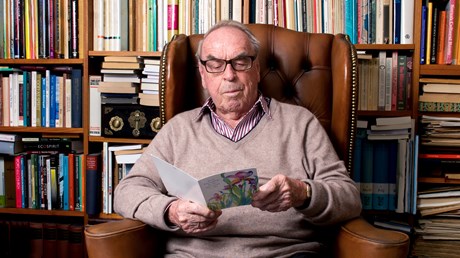The Generous Genius of Jürgen Moltmann
Memories and reflections of the famed theologian from his last overseas doctoral student and friend of 33 years.

When he died at home in Tübingen, Germany, last Monday morning at age 98, the world could justly say that Jürgen Moltmann was the leading Christian theologian of the second half of the 20th century. He had championed liberation theology from South America, then imported it successfully to the West. He had inaugurated an eschatological “theology of hope” and freshly underlined the role of the Holy Spirit in mainstream Protestant and Catholic theology alike. His 1973 book, The Crucified God, had developed an almost instantaneous following among evangelical Christians on both sides of the Atlantic, and the full list of Moltmann’s literary output is dazzling.
I was Moltmann’s last overseas doctoral student, and we were close friends for 33 years. On Wednesday, I will fly to Germany to attend his funeral and interment at Tübingen. But today, I want to share with you a glimpse of his remarkable and faithful life.
Moltmann’s theological thinking emerged initially as the result of his captivity, from 1945 to 1948, as a German prisoner of war in Britain, as well as his searing experience as a teenage anti-aircraft gunner during the 1943 British air raid on Hamburg, his native city. After the war ended, he returned to Germany and studied theology at Göttingen under the Reformed theologian Otto Weber, and was much influenced by Karl Barth.
Moltmann then spent five years as a local pastor outside Bremen, during which time his wife Elisabeth gave birth to a stillborn child. It seemed an absurd and despairing event at the time, before the couple would go on to have four healthy daughters—how much more loss could God impose?
After that early pastorate, Moltmann ...
